Solved STA101 Statistics for Business Assignment 1: Detailed Analysis
VerifiedAdded on 2023/06/04
|13
|1672
|354
Homework Assignment
AI Summary
This assignment solution covers key statistical concepts within a business context. It includes the calculation and interpretation of covariance and correlation between years of experience and salary, providing reasons for negative relationships. The solution also addresses problems related to exponential distribution, calculating probabilities and waiting times. Furthermore, it includes hypothesis testing, computation of Type II error probability, power of the test, and the effects of changing sample size. A final question focuses on hypothesis testing for production filling operations, using z-scores to determine the significance of the test. Desklib provides this document, along with numerous other solved assignments and study resources, to aid students in their academic pursuits.
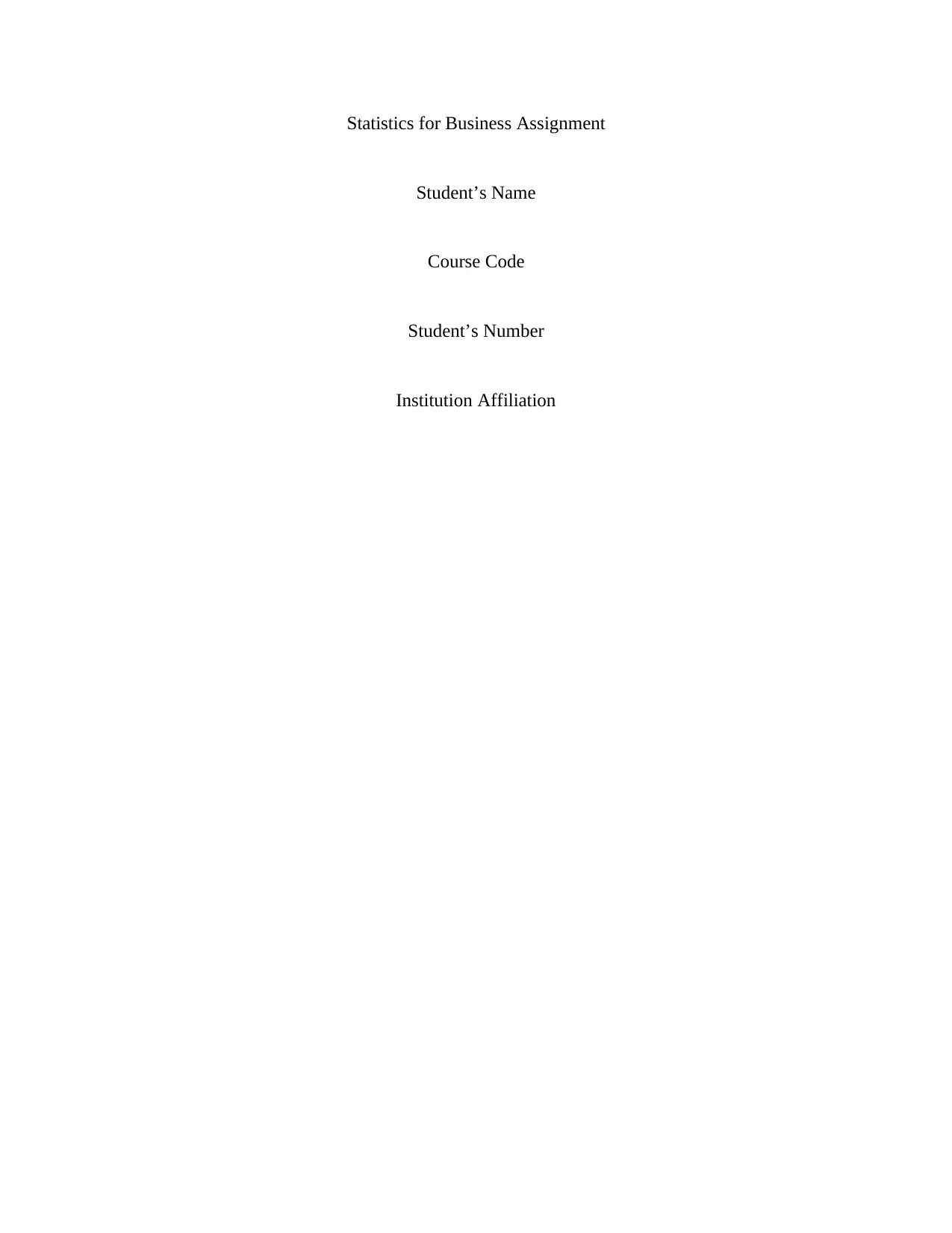
Statistics for Business Assignment
Student’s Name
Course Code
Student’s Number
Institution Affiliation
Student’s Name
Course Code
Student’s Number
Institution Affiliation
Paraphrase This Document
Need a fresh take? Get an instant paraphrase of this document with our AI Paraphraser
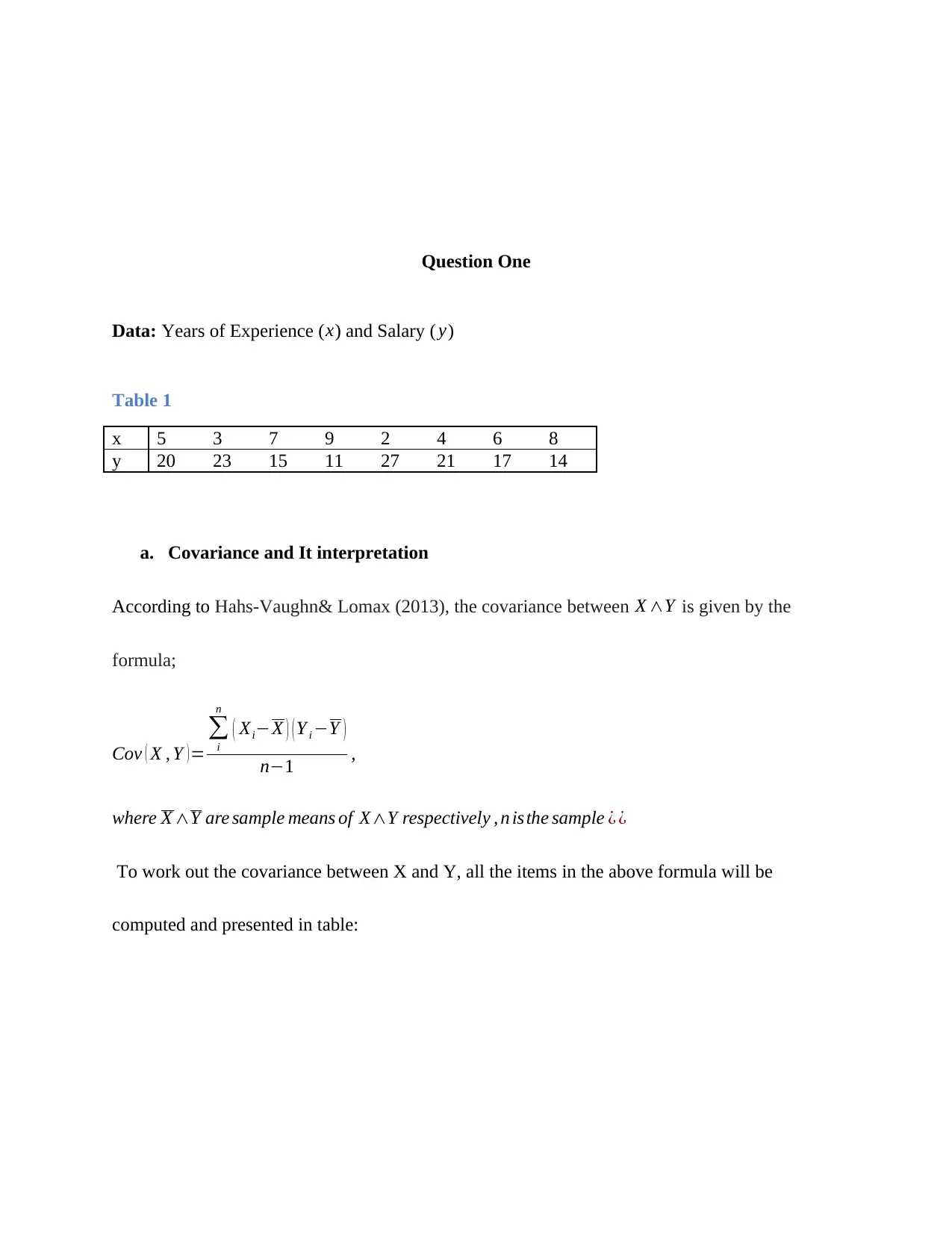
Question One
Data: Years of Experience (x) and Salary ( y)
Table 1
x 5 3 7 9 2 4 6 8
y 20 23 15 11 27 21 17 14
a. Covariance and It interpretation
According to Hahs-Vaughn& Lomax (2013), the covariance between X ∧Y is given by the
formula;
Cov ( X , Y )=
∑
i
n
( Xi−X ) ( Y i −Y )
n−1 ,
where X ∧Y are sample means of X∧Y respectively , n isthe sample ¿ ¿
To work out the covariance between X and Y, all the items in the above formula will be
computed and presented in table:
Data: Years of Experience (x) and Salary ( y)
Table 1
x 5 3 7 9 2 4 6 8
y 20 23 15 11 27 21 17 14
a. Covariance and It interpretation
According to Hahs-Vaughn& Lomax (2013), the covariance between X ∧Y is given by the
formula;
Cov ( X , Y )=
∑
i
n
( Xi−X ) ( Y i −Y )
n−1 ,
where X ∧Y are sample means of X∧Y respectively , n isthe sample ¿ ¿
To work out the covariance between X and Y, all the items in the above formula will be
computed and presented in table:
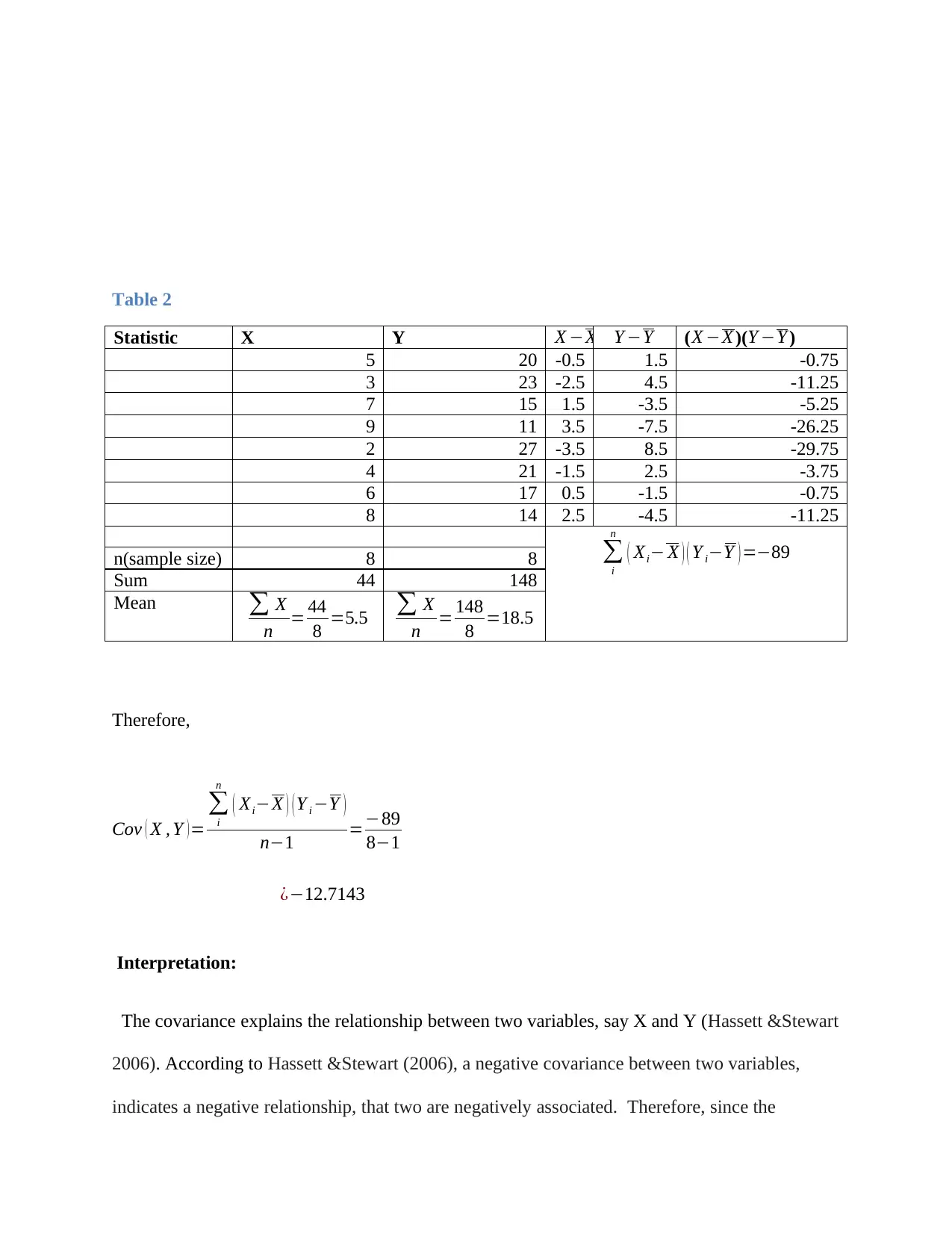
Table 2
Statistic X Y X −X Y −Y (X −X )(Y −Y )
5 20 -0.5 1.5 -0.75
3 23 -2.5 4.5 -11.25
7 15 1.5 -3.5 -5.25
9 11 3.5 -7.5 -26.25
2 27 -3.5 8.5 -29.75
4 21 -1.5 2.5 -3.75
6 17 0.5 -1.5 -0.75
8 14 2.5 -4.5 -11.25
∑
i
n
( Xi− X ) ( Y i−Y ) =−89n(sample size) 8 8
Sum 44 148
Mean ∑ X
n = 44
8 =5.5 ∑ X
n = 148
8 =18.5
Therefore,
Cov ( X , Y ) =
∑
i
n
( Xi−X ) ( Y i −Y )
n−1 =−89
8−1
¿−12.7143
Interpretation:
The covariance explains the relationship between two variables, say X and Y (Hassett &Stewart
2006). According to Hassett &Stewart (2006), a negative covariance between two variables,
indicates a negative relationship, that two are negatively associated. Therefore, since the
Statistic X Y X −X Y −Y (X −X )(Y −Y )
5 20 -0.5 1.5 -0.75
3 23 -2.5 4.5 -11.25
7 15 1.5 -3.5 -5.25
9 11 3.5 -7.5 -26.25
2 27 -3.5 8.5 -29.75
4 21 -1.5 2.5 -3.75
6 17 0.5 -1.5 -0.75
8 14 2.5 -4.5 -11.25
∑
i
n
( Xi− X ) ( Y i−Y ) =−89n(sample size) 8 8
Sum 44 148
Mean ∑ X
n = 44
8 =5.5 ∑ X
n = 148
8 =18.5
Therefore,
Cov ( X , Y ) =
∑
i
n
( Xi−X ) ( Y i −Y )
n−1 =−89
8−1
¿−12.7143
Interpretation:
The covariance explains the relationship between two variables, say X and Y (Hassett &Stewart
2006). According to Hassett &Stewart (2006), a negative covariance between two variables,
indicates a negative relationship, that two are negatively associated. Therefore, since the
⊘ This is a preview!⊘
Do you want full access?
Subscribe today to unlock all pages.

Trusted by 1+ million students worldwide
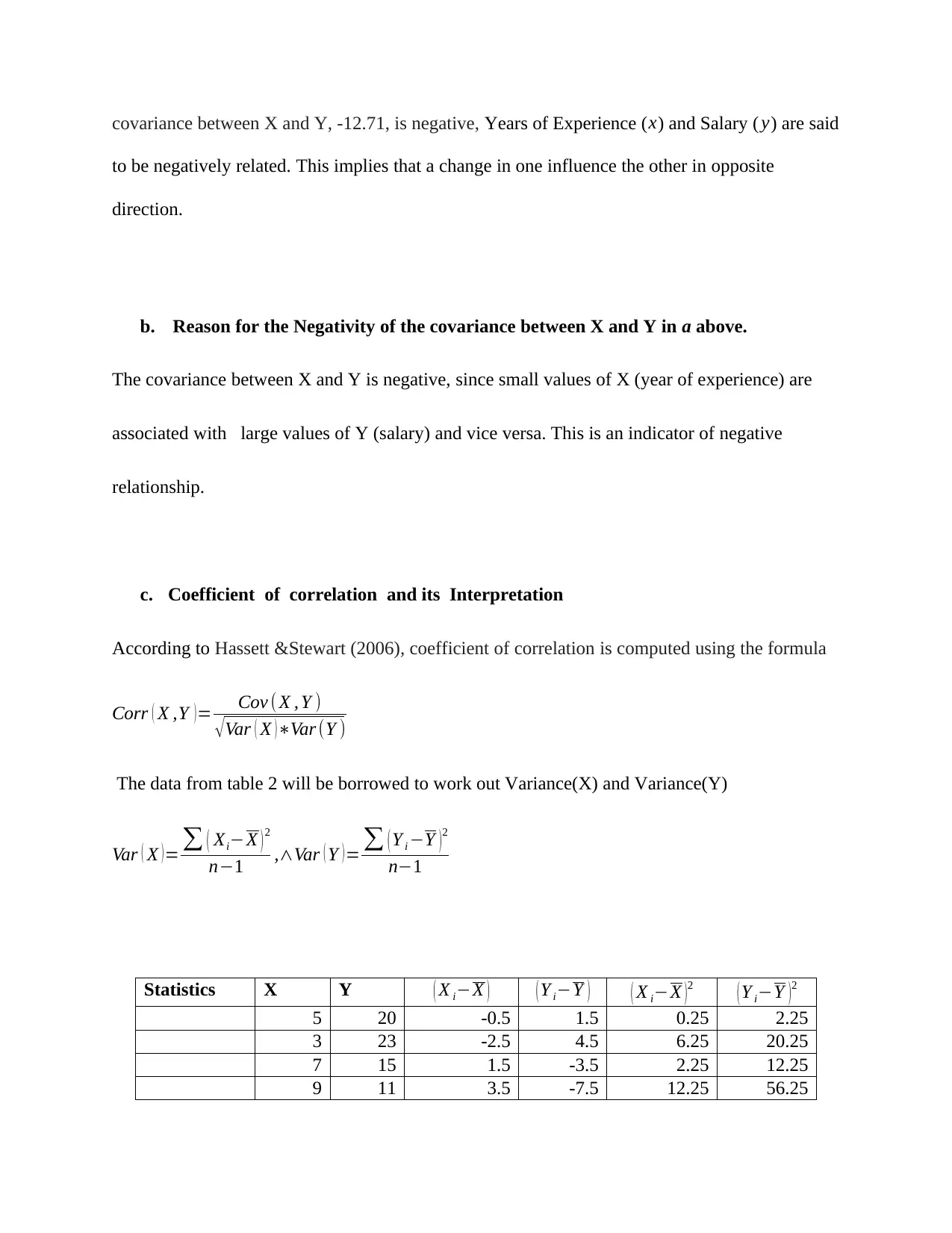
covariance between X and Y, -12.71, is negative, Years of Experience (x) and Salary ( y) are said
to be negatively related. This implies that a change in one influence the other in opposite
direction.
b. Reason for the Negativity of the covariance between X and Y in a above.
The covariance between X and Y is negative, since small values of X (year of experience) are
associated with large values of Y (salary) and vice versa. This is an indicator of negative
relationship.
c. Coefficient of correlation and its Interpretation
According to Hassett &Stewart (2006), coefficient of correlation is computed using the formula
Corr ( X ,Y )= Cov ( X , Y )
√Var ( X )∗Var (Y )
The data from table 2 will be borrowed to work out Variance(X) and Variance(Y)
Var ( X )= ∑ ( Xi−X ) 2
n−1 ,∧Var ( Y )= ∑ ( Y i −Y )2
n−1
Statistics X Y ( X i−X ) ( Y i−Y ) ( X i−X )2
( Y i−Y )2
5 20 -0.5 1.5 0.25 2.25
3 23 -2.5 4.5 6.25 20.25
7 15 1.5 -3.5 2.25 12.25
9 11 3.5 -7.5 12.25 56.25
to be negatively related. This implies that a change in one influence the other in opposite
direction.
b. Reason for the Negativity of the covariance between X and Y in a above.
The covariance between X and Y is negative, since small values of X (year of experience) are
associated with large values of Y (salary) and vice versa. This is an indicator of negative
relationship.
c. Coefficient of correlation and its Interpretation
According to Hassett &Stewart (2006), coefficient of correlation is computed using the formula
Corr ( X ,Y )= Cov ( X , Y )
√Var ( X )∗Var (Y )
The data from table 2 will be borrowed to work out Variance(X) and Variance(Y)
Var ( X )= ∑ ( Xi−X ) 2
n−1 ,∧Var ( Y )= ∑ ( Y i −Y )2
n−1
Statistics X Y ( X i−X ) ( Y i−Y ) ( X i−X )2
( Y i−Y )2
5 20 -0.5 1.5 0.25 2.25
3 23 -2.5 4.5 6.25 20.25
7 15 1.5 -3.5 2.25 12.25
9 11 3.5 -7.5 12.25 56.25
Paraphrase This Document
Need a fresh take? Get an instant paraphrase of this document with our AI Paraphraser
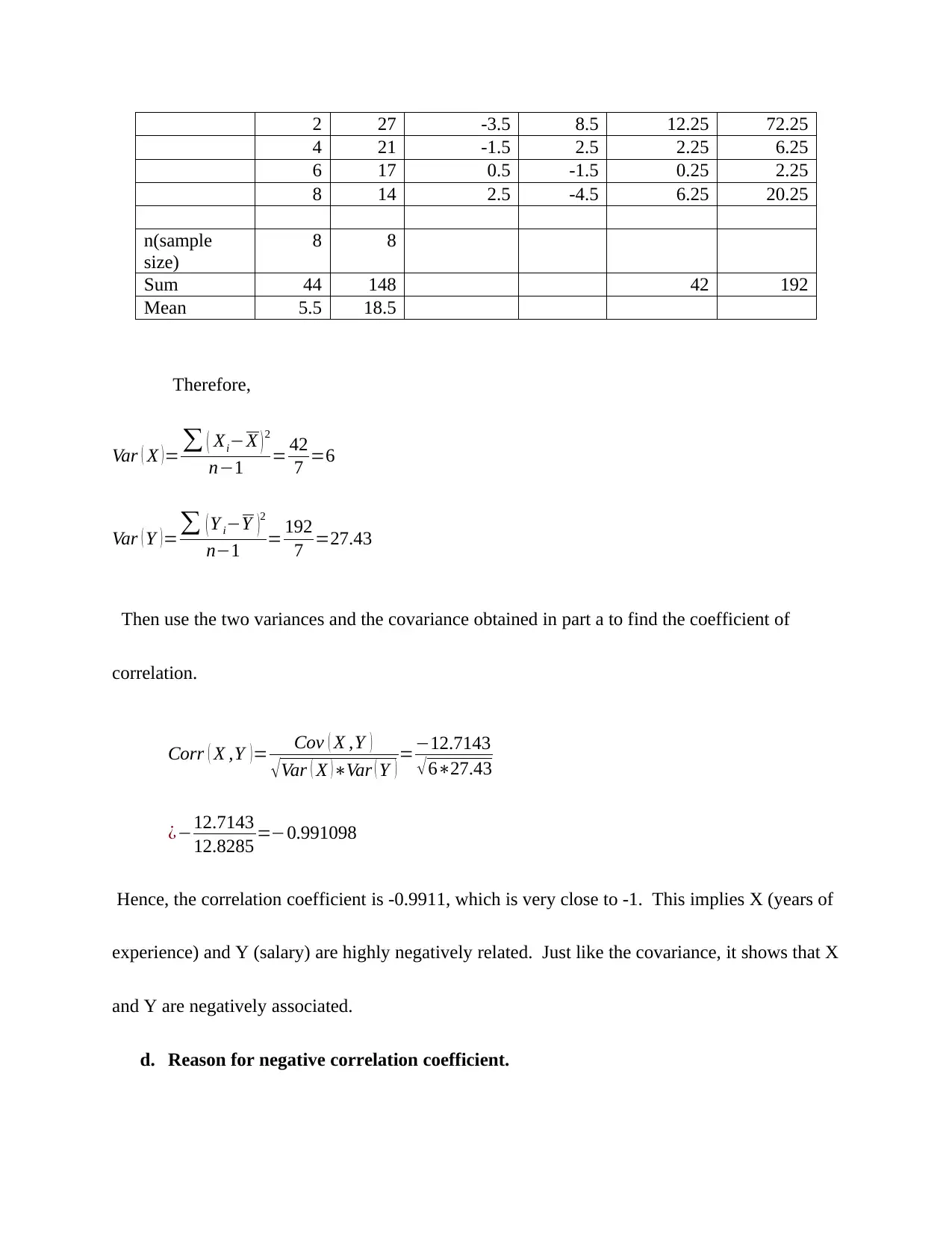
2 27 -3.5 8.5 12.25 72.25
4 21 -1.5 2.5 2.25 6.25
6 17 0.5 -1.5 0.25 2.25
8 14 2.5 -4.5 6.25 20.25
n(sample
size)
8 8
Sum 44 148 42 192
Mean 5.5 18.5
Therefore,
Var ( X )= ∑ ( Xi−X ) 2
n−1 = 42
7 =6
Var ( Y )=∑ ( Y i−Y )2
n−1 = 192
7 =27.43
Then use the two variances and the covariance obtained in part a to find the coefficient of
correlation.
Corr ( X ,Y )= Cov ( X ,Y )
√Var ( X )∗Var ( Y ) =−12.7143
√6∗27.43
¿−12.7143
12.8285 =−0.991098
Hence, the correlation coefficient is -0.9911, which is very close to -1. This implies X (years of
experience) and Y (salary) are highly negatively related. Just like the covariance, it shows that X
and Y are negatively associated.
d. Reason for negative correlation coefficient.
4 21 -1.5 2.5 2.25 6.25
6 17 0.5 -1.5 0.25 2.25
8 14 2.5 -4.5 6.25 20.25
n(sample
size)
8 8
Sum 44 148 42 192
Mean 5.5 18.5
Therefore,
Var ( X )= ∑ ( Xi−X ) 2
n−1 = 42
7 =6
Var ( Y )=∑ ( Y i−Y )2
n−1 = 192
7 =27.43
Then use the two variances and the covariance obtained in part a to find the coefficient of
correlation.
Corr ( X ,Y )= Cov ( X ,Y )
√Var ( X )∗Var ( Y ) =−12.7143
√6∗27.43
¿−12.7143
12.8285 =−0.991098
Hence, the correlation coefficient is -0.9911, which is very close to -1. This implies X (years of
experience) and Y (salary) are highly negatively related. Just like the covariance, it shows that X
and Y are negatively associated.
d. Reason for negative correlation coefficient.
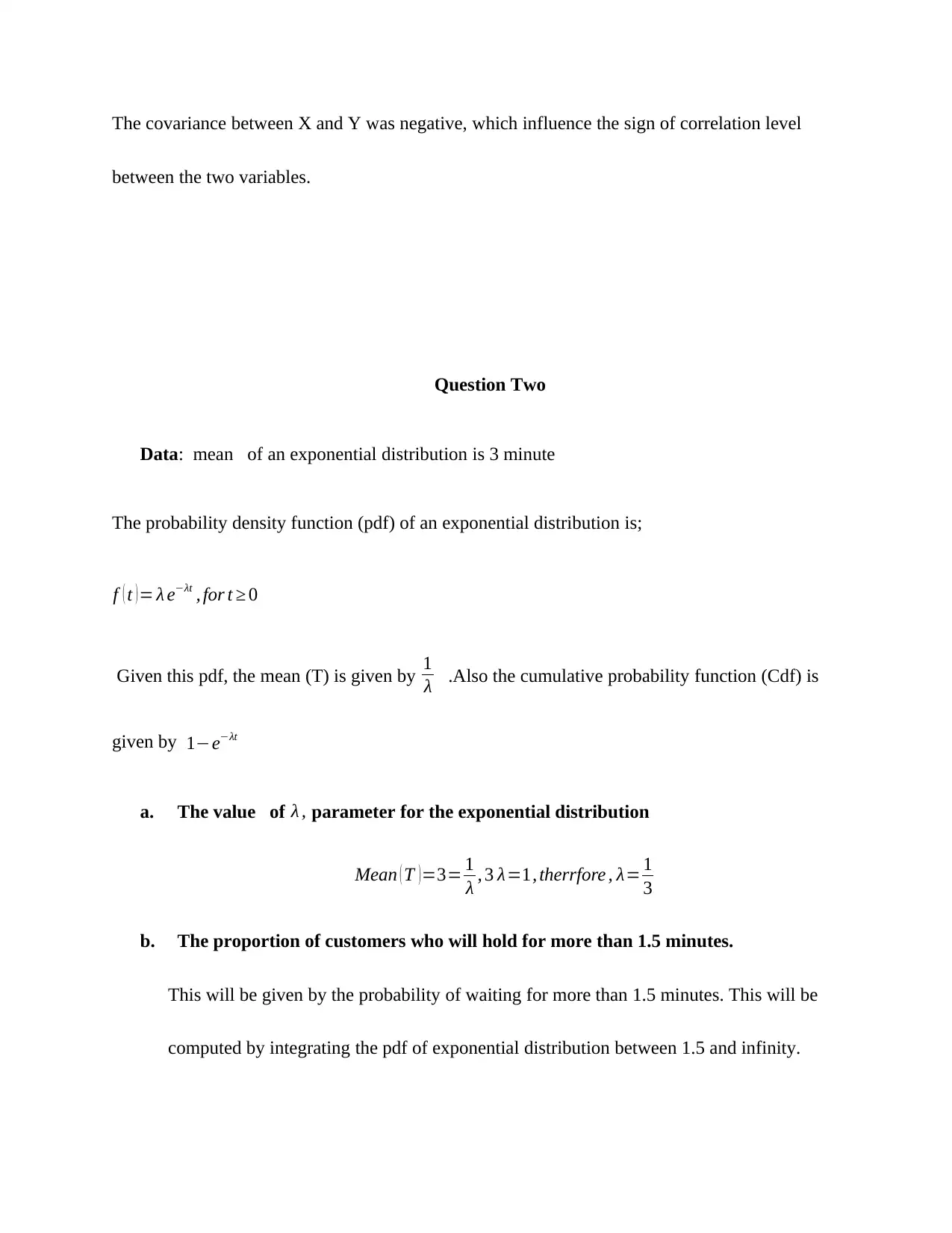
The covariance between X and Y was negative, which influence the sign of correlation level
between the two variables.
Question Two
Data: mean of an exponential distribution is 3 minute
The probability density function (pdf) of an exponential distribution is;
f ( t )= λ e−λt , for t ≥ 0
Given this pdf, the mean (T) is given by 1
λ .Also the cumulative probability function (Cdf) is
given by 1−e−λt
a. The value of λ , parameter for the exponential distribution
Mean ( T )=3= 1
λ , 3 λ=1, therrfore , λ= 1
3
b. The proportion of customers who will hold for more than 1.5 minutes.
This will be given by the probability of waiting for more than 1.5 minutes. This will be
computed by integrating the pdf of exponential distribution between 1.5 and infinity.
between the two variables.
Question Two
Data: mean of an exponential distribution is 3 minute
The probability density function (pdf) of an exponential distribution is;
f ( t )= λ e−λt , for t ≥ 0
Given this pdf, the mean (T) is given by 1
λ .Also the cumulative probability function (Cdf) is
given by 1−e−λt
a. The value of λ , parameter for the exponential distribution
Mean ( T )=3= 1
λ , 3 λ=1, therrfore , λ= 1
3
b. The proportion of customers who will hold for more than 1.5 minutes.
This will be given by the probability of waiting for more than 1.5 minutes. This will be
computed by integrating the pdf of exponential distribution between 1.5 and infinity.
⊘ This is a preview!⊘
Do you want full access?
Subscribe today to unlock all pages.

Trusted by 1+ million students worldwide
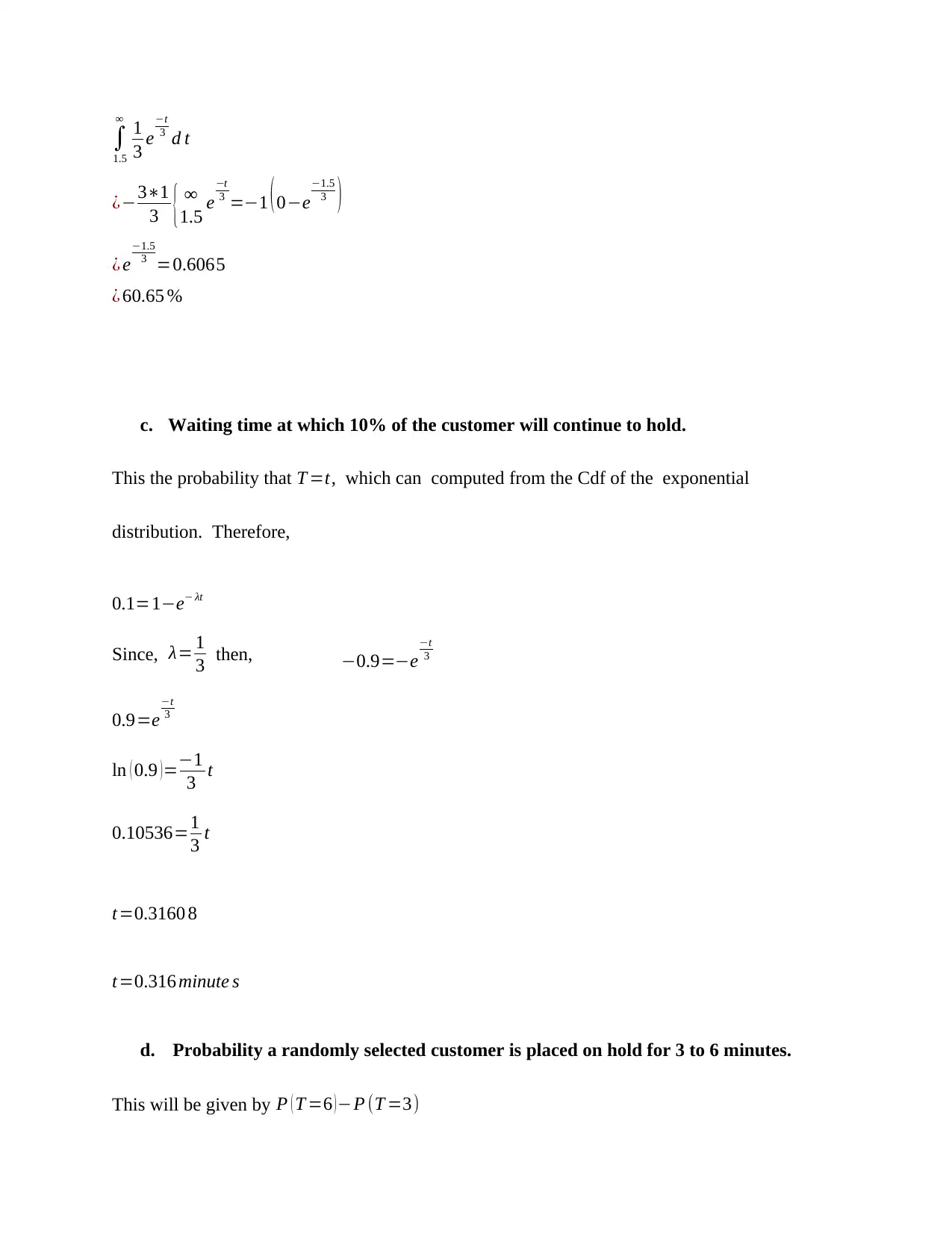
∫
1.5
∞
1
3 e
−t
3 d t
¿−3∗1
3 { ∞
1.5 e
−t
3 =−1 ( 0−e
−1.5
3 )
¿ e
−1.5
3 =0.6065
¿ 60.65 %
c. Waiting time at which 10% of the customer will continue to hold.
This the probability that T =t, which can computed from the Cdf of the exponential
distribution. Therefore,
0.1=1−e− λt
Since, λ= 1
3 then, −0.9=−e
−t
3
0.9=e
−t
3
ln ( 0.9 )=−1
3 t
0.10536=1
3 t
t=0.3160 8
t=0.316 minute s
d. Probability a randomly selected customer is placed on hold for 3 to 6 minutes.
This will be given by P ( T =6 ) −P (T =3)
1.5
∞
1
3 e
−t
3 d t
¿−3∗1
3 { ∞
1.5 e
−t
3 =−1 ( 0−e
−1.5
3 )
¿ e
−1.5
3 =0.6065
¿ 60.65 %
c. Waiting time at which 10% of the customer will continue to hold.
This the probability that T =t, which can computed from the Cdf of the exponential
distribution. Therefore,
0.1=1−e− λt
Since, λ= 1
3 then, −0.9=−e
−t
3
0.9=e
−t
3
ln ( 0.9 )=−1
3 t
0.10536=1
3 t
t=0.3160 8
t=0.316 minute s
d. Probability a randomly selected customer is placed on hold for 3 to 6 minutes.
This will be given by P ( T =6 ) −P (T =3)
Paraphrase This Document
Need a fresh take? Get an instant paraphrase of this document with our AI Paraphraser
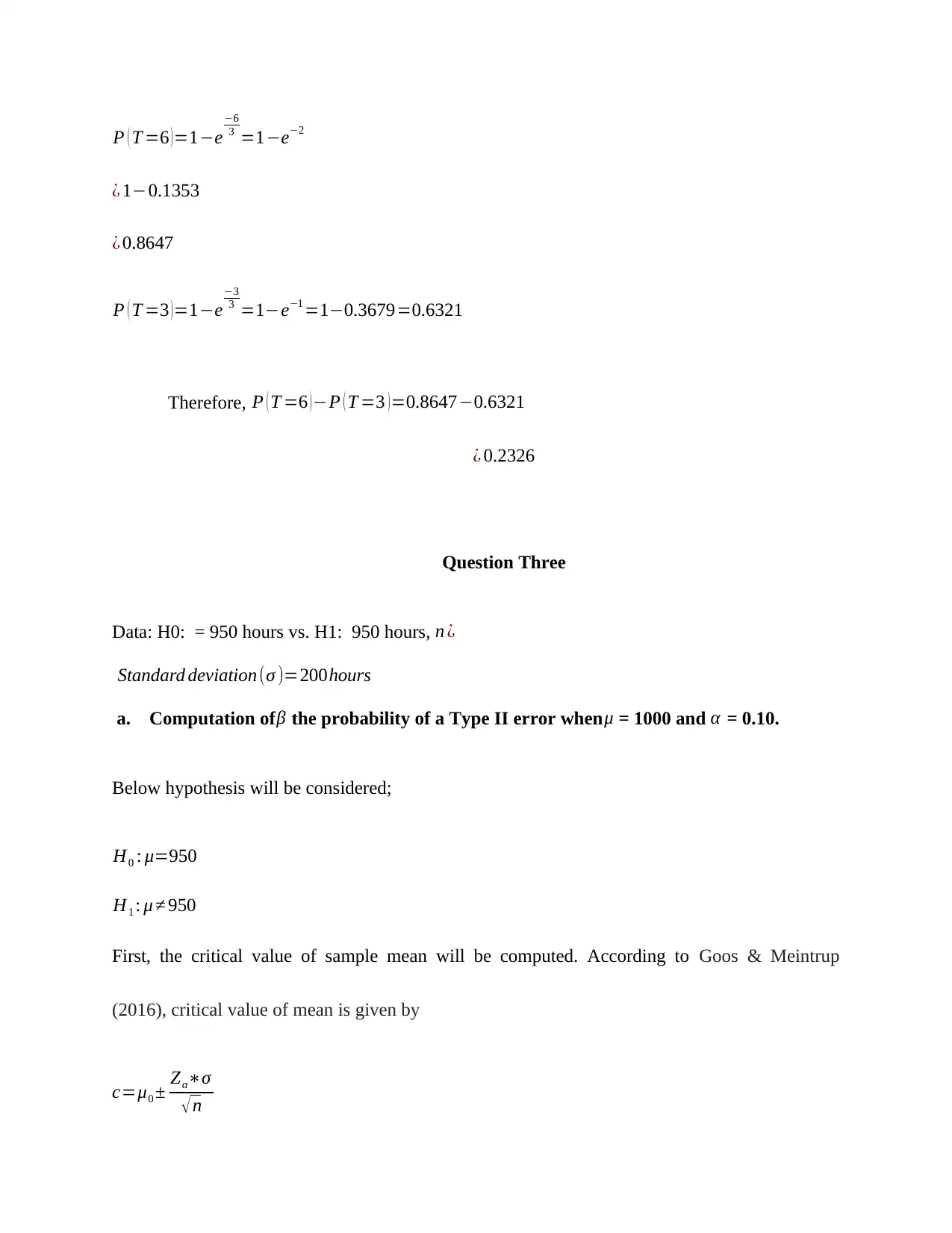
P ( T =6 )=1−e
−6
3 =1−e−2
¿ 1−0.1353
¿ 0.8647
P ( T =3 )=1−e
−3
3 =1−e−1 =1−0.3679=0.6321
Therefore, P ( T =6 )−P ( T =3 )=0.8647−0.6321
¿ 0.2326
Question Three
Data: H0: = 950 hours vs. H1: 950 hours, n ¿
Standard deviation(σ )=200hours
a. Computation of β the probability of a Type II error when μ = 1000 and α = 0.10.
Below hypothesis will be considered;
H0 : μ=950
H1 : μ ≠ 950
First, the critical value of sample mean will be computed. According to Goos & Meintrup
(2016), critical value of mean is given by
c=μ0 ± Zα∗σ
√ n
−6
3 =1−e−2
¿ 1−0.1353
¿ 0.8647
P ( T =3 )=1−e
−3
3 =1−e−1 =1−0.3679=0.6321
Therefore, P ( T =6 )−P ( T =3 )=0.8647−0.6321
¿ 0.2326
Question Three
Data: H0: = 950 hours vs. H1: 950 hours, n ¿
Standard deviation(σ )=200hours
a. Computation of β the probability of a Type II error when μ = 1000 and α = 0.10.
Below hypothesis will be considered;
H0 : μ=950
H1 : μ ≠ 950
First, the critical value of sample mean will be computed. According to Goos & Meintrup
(2016), critical value of mean is given by
c=μ0 ± Zα∗σ
√ n
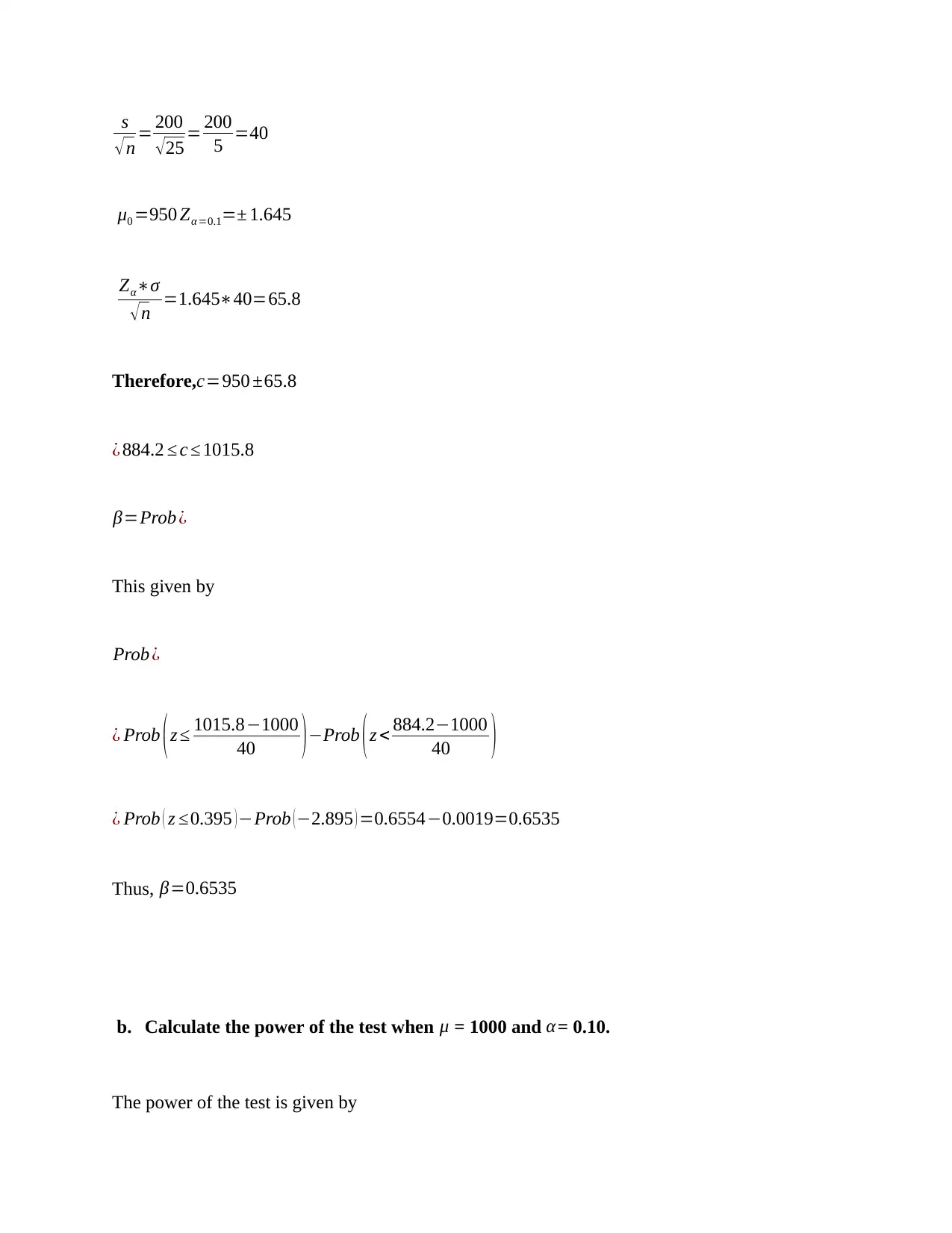
s
√n = 200
√25 = 200
5 =40
μ0 =950 Zα =0.1=± 1.645
Zα∗σ
√n =1.645∗40=65.8
Therefore,c=950 ±65.8
¿ 884.2 ≤ c ≤ 1015.8
β=Prob ¿
This given by
Prob ¿
¿ Prob (z ≤ 1015.8−1000
40 )−Prob (z < 884.2−1000
40 )
¿ Prob ( z ≤0.395 )−Prob (−2.895 ) =0.6554−0.0019=0.6535
Thus, β=0.6535
b. Calculate the power of the test when μ = 1000 and α= 0.10.
The power of the test is given by
√n = 200
√25 = 200
5 =40
μ0 =950 Zα =0.1=± 1.645
Zα∗σ
√n =1.645∗40=65.8
Therefore,c=950 ±65.8
¿ 884.2 ≤ c ≤ 1015.8
β=Prob ¿
This given by
Prob ¿
¿ Prob (z ≤ 1015.8−1000
40 )−Prob (z < 884.2−1000
40 )
¿ Prob ( z ≤0.395 )−Prob (−2.895 ) =0.6554−0.0019=0.6535
Thus, β=0.6535
b. Calculate the power of the test when μ = 1000 and α= 0.10.
The power of the test is given by
⊘ This is a preview!⊘
Do you want full access?
Subscribe today to unlock all pages.

Trusted by 1+ million students worldwide
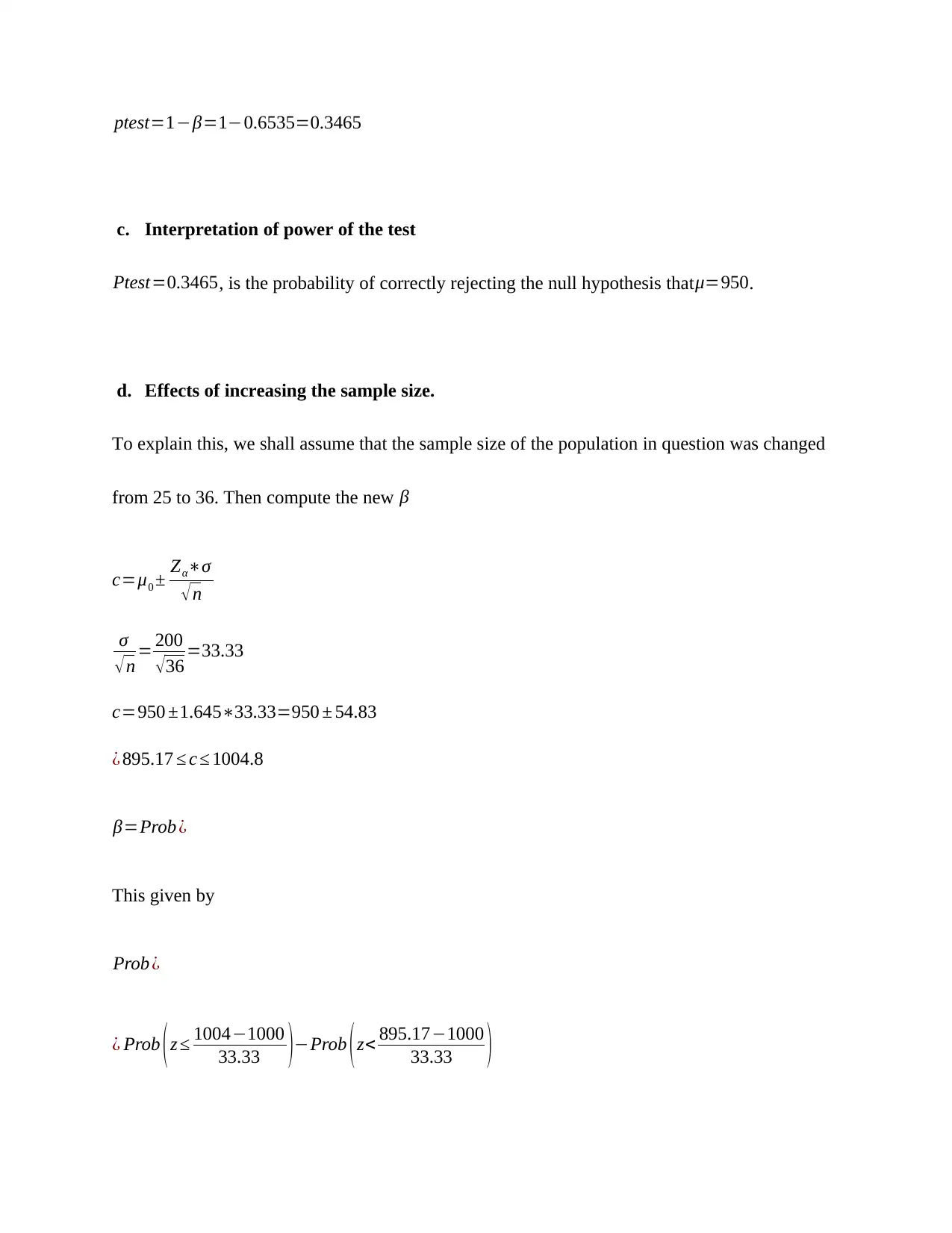
ptest=1−β=1−0.6535=0.3465
c. Interpretation of power of the test
Ptest=0.3465, is the probability of correctly rejecting the null hypothesis thatμ=950.
d. Effects of increasing the sample size.
To explain this, we shall assume that the sample size of the population in question was changed
from 25 to 36. Then compute the new β
c=μ0 ± Zα∗σ
√ n
σ
√n = 200
√36 =33.33
c=950 ±1.645∗33.33=950 ± 54.83
¿ 895.17 ≤ c ≤ 1004.8
β=Prob ¿
This given by
Prob ¿
¿ Prob (z ≤ 1004−1000
33.33 )−Prob (z< 895.17−1000
33.33 )
c. Interpretation of power of the test
Ptest=0.3465, is the probability of correctly rejecting the null hypothesis thatμ=950.
d. Effects of increasing the sample size.
To explain this, we shall assume that the sample size of the population in question was changed
from 25 to 36. Then compute the new β
c=μ0 ± Zα∗σ
√ n
σ
√n = 200
√36 =33.33
c=950 ±1.645∗33.33=950 ± 54.83
¿ 895.17 ≤ c ≤ 1004.8
β=Prob ¿
This given by
Prob ¿
¿ Prob (z ≤ 1004−1000
33.33 )−Prob (z< 895.17−1000
33.33 )
Paraphrase This Document
Need a fresh take? Get an instant paraphrase of this document with our AI Paraphraser
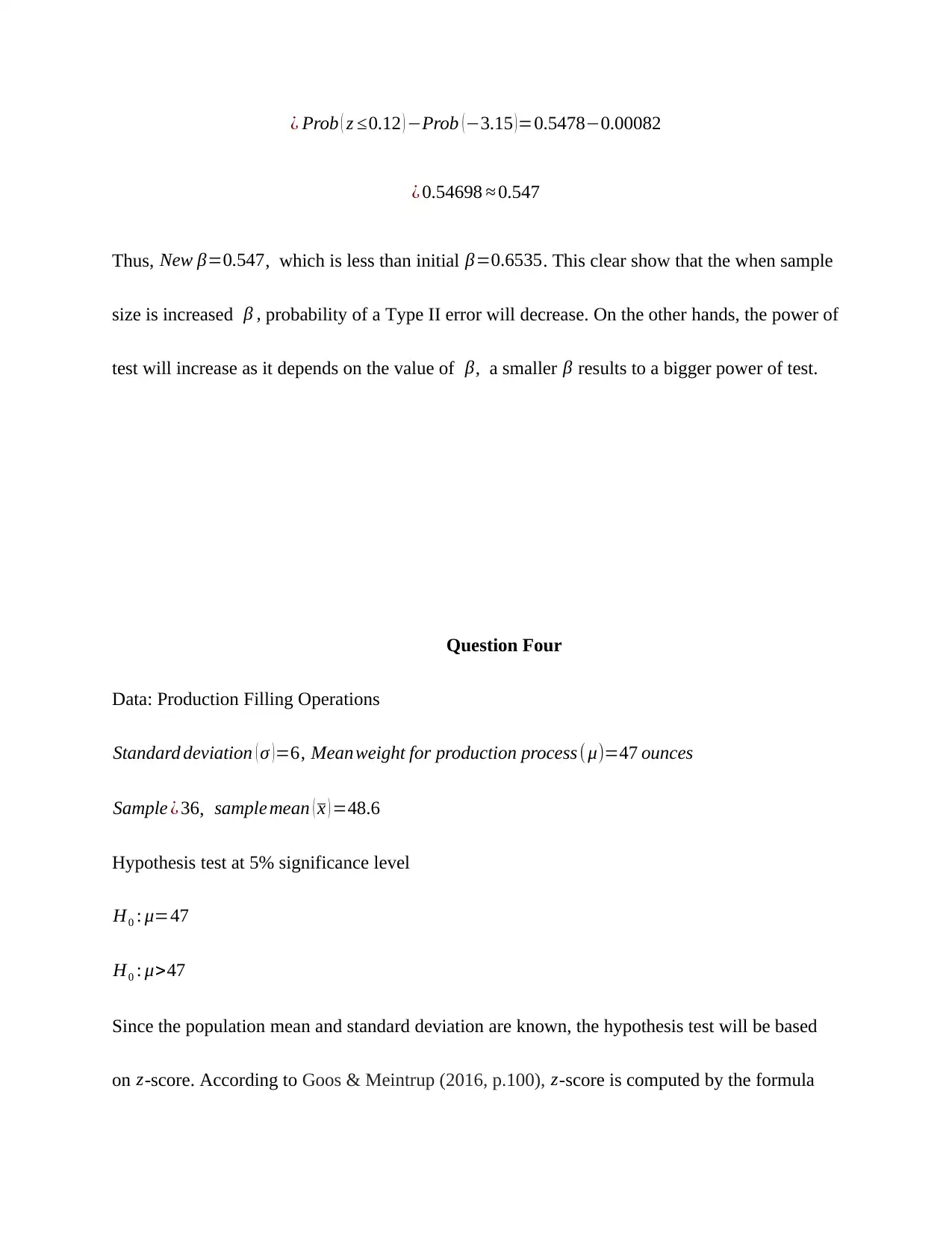
¿ Prob ( z ≤0.12 ) −Prob (−3.15 )=0.5478−0.00082
¿ 0.54698 ≈ 0.547
Thus, New β=0.547, which is less than initial β=0.6535. This clear show that the when sample
size is increased β , probability of a Type II error will decrease. On the other hands, the power of
test will increase as it depends on the value of β, a smaller β results to a bigger power of test.
Question Four
Data: Production Filling Operations
Standard deviation ( σ )=6, Mean weight for production process ( μ)=47 ounces
Sample ¿ 36, sample mean ( x ) =48.6
Hypothesis test at 5% significance level
H0 : μ=47
H0 : μ>47
Since the population mean and standard deviation are known, the hypothesis test will be based
on z-score. According to Goos & Meintrup (2016, p.100), z-score is computed by the formula
¿ 0.54698 ≈ 0.547
Thus, New β=0.547, which is less than initial β=0.6535. This clear show that the when sample
size is increased β , probability of a Type II error will decrease. On the other hands, the power of
test will increase as it depends on the value of β, a smaller β results to a bigger power of test.
Question Four
Data: Production Filling Operations
Standard deviation ( σ )=6, Mean weight for production process ( μ)=47 ounces
Sample ¿ 36, sample mean ( x ) =48.6
Hypothesis test at 5% significance level
H0 : μ=47
H0 : μ>47
Since the population mean and standard deviation are known, the hypothesis test will be based
on z-score. According to Goos & Meintrup (2016, p.100), z-score is computed by the formula
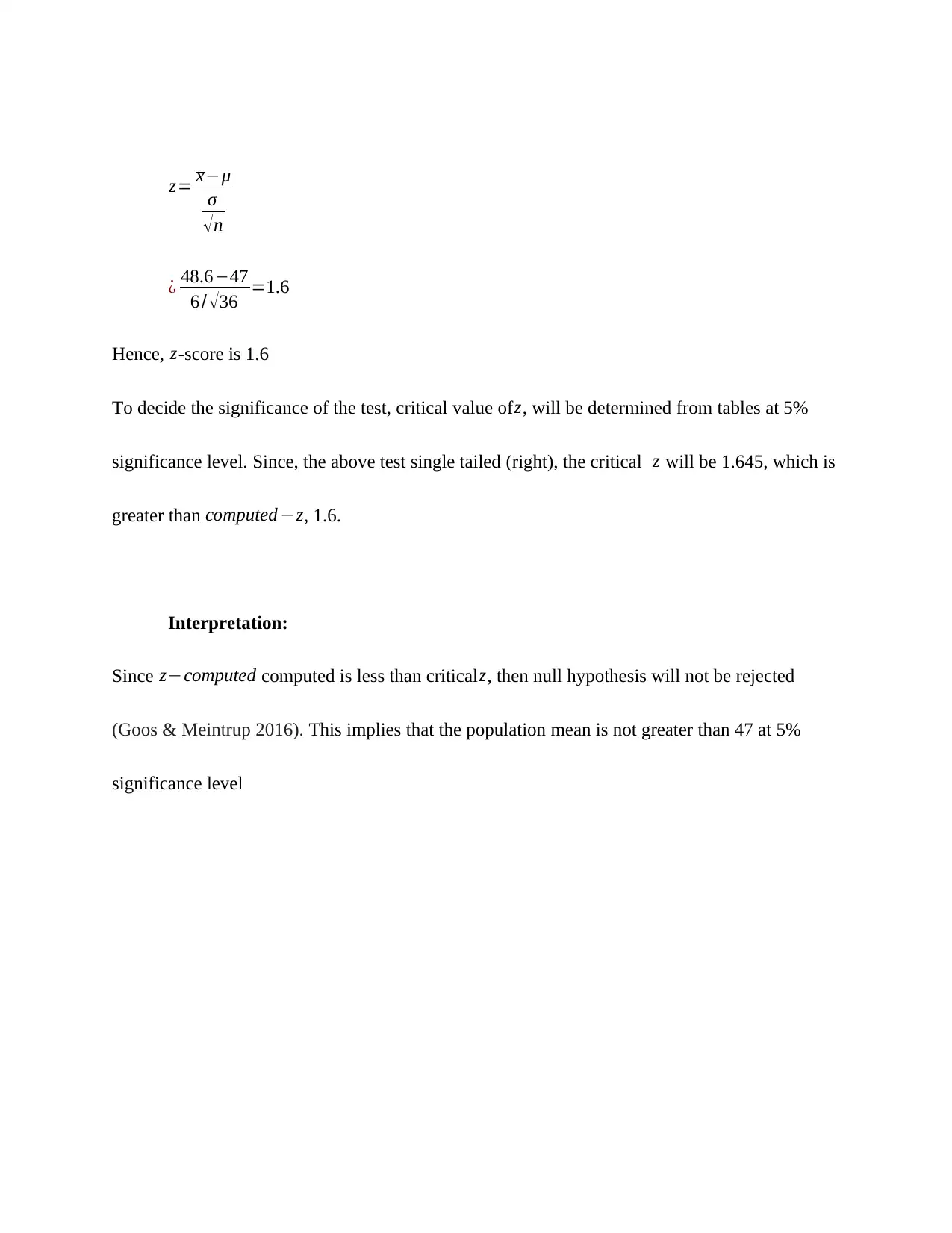
z= x−μ
σ
√ n
¿ 48.6−47
6 / √36 =1.6
Hence, z-score is 1.6
To decide the significance of the test, critical value of z, will be determined from tables at 5%
significance level. Since, the above test single tailed (right), the critical z will be 1.645, which is
greater than computed −z, 1.6.
Interpretation:
Since z−computed computed is less than critical z, then null hypothesis will not be rejected
(Goos & Meintrup 2016). This implies that the population mean is not greater than 47 at 5%
significance level
σ
√ n
¿ 48.6−47
6 / √36 =1.6
Hence, z-score is 1.6
To decide the significance of the test, critical value of z, will be determined from tables at 5%
significance level. Since, the above test single tailed (right), the critical z will be 1.645, which is
greater than computed −z, 1.6.
Interpretation:
Since z−computed computed is less than critical z, then null hypothesis will not be rejected
(Goos & Meintrup 2016). This implies that the population mean is not greater than 47 at 5%
significance level
⊘ This is a preview!⊘
Do you want full access?
Subscribe today to unlock all pages.

Trusted by 1+ million students worldwide
1 out of 13
Related Documents
Your All-in-One AI-Powered Toolkit for Academic Success.
+13062052269
info@desklib.com
Available 24*7 on WhatsApp / Email
![[object Object]](/_next/static/media/star-bottom.7253800d.svg)
Unlock your academic potential
Copyright © 2020–2025 A2Z Services. All Rights Reserved. Developed and managed by ZUCOL.




